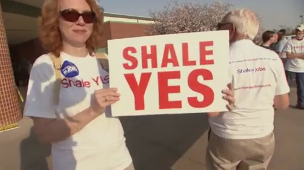North Carolina gathers public feedback on fracking

North Carolina regulators are asking the public to weigh in on a proposal to lift the state's ban on hydraulic fracturing or fracking, a controversial technique of drilling for natural gas that involves injecting highly pressurized fluid containing water, sand and chemicals into underground shale rock formations.
Late last week the state's Department of Environment and Natural Resources (DENR) released a long-awaited draft report on fracking that concluded the practice -- which has been linked to water contamination and air pollution in other states -- could be carried out safely with careful regulation.
The draft report's unveiling came just days after the revelation that outgoing Gov. Beverly Perdue (D) took an unannounced trip to Pennsylvania on March 5 to visit Shell Oil fracking operations. The secret nature of the tour came under fire from environmental advocates as well as from Republican gubernatorial candidate Pat McCrory, who supports fracking.
On March 20, DENR held the first of two scheduled public hearings to collect comments on the draft report. The hearing took place at the Wicker Civic Center in Sanford, a city in Lee County, which is at the center of the state's major shale formation. It drew a divided crowd of more than 500 people.
The hearing opened with a presentation by Robin Smith, DENR's assistant secretary for environmental protection. She discussed the many limitations of her agency's study, including a lack of information about the extent of the state's shale gas reserves, the short timeframe that the pro-fracking Republican leadership in the General Assembly gave the agency to conduct the $100,000 study, and the fact that the consumer protection section being prepared by the state Attorney General's office has not yet been completed.
She also said that more research is needed into fracking's impacts on health, local governments, infrastructure and the economy.
"There is a lot of projecting going on because there is a limited amount of data in the report," Smith acknowledged.
DENR's report makes numerous recommendations that include collecting pre-drilling baseline data on groundwater, improving existing state oil and gas well construction standards, developing setback requirements for drilling operations, identifying areas where drilling should not occur, and developing waste management standards since the federal government has exempted many potentially hazardous oil and gas wastes from regulation.
DENR is also calling for full disclosure of fracking chemicals to state agencies as well as public disclosure with exemptions for trade secrets. In addition, the agency says that environmental permitting for fracking options should be placed under its purview where it can benefit from regulatory expertise and coordination.
Among those speaking in favor of fracking at the Sanford hearing were representatives of the local Chamber of Commerce and Bill Weatherspoon, executive director of the N.C. Petroleum Council. The group is a division of the American Petroleum Institute, the main lobbying group for the oil and gas industry.
"I can assure you that my industry wants to make North Carolina the model for the nation, and we will work to get it right for you," Weatherspoon said.
Other pro-fracking proponents included activists with FreedomWorks, a nonprofit organization chaired by former U.S. House Majority Leader Dick Armey (R-Texas) that has been heavily involved in the tea party movement. They repeated a slogan -- "Shale YES!" -- that was also emblazoned on their T-shirts and the signs some waved outside the civic center before the hearing.
Among the many speakers critical of fracking were Hope Taylor, director of Clean Water for North Carolina and a farmer and well user in the area targeted for fracking.
"I don't believe the people who wrote this report wrote the press release," she said, pointing to the contrast between the many uncertainties and potential problems raised in DENR's study and the press release's conclusion that fracking could still be done safely.
A similar concern was raised by Sally Kost, a Democratic commissioner in Chatham County, which is also in the targeted fracking zone.
"I have to wonder why is DENR giving the green light, at least now before we have the answers," said Kost. "I've found very little in this report that would hint, let alone conclude, that this is something we want in North Carolina."
The three-hour hearing got emotional at times, with loud cheering and applause for speakers on both sides of the issue. Local law enforcement was on hand to keep order.
The next public hearing is set for March 27 in Chapel Hill, N.C., and written comments will be accepted through April 1. The final report is due to the General Assembly by May 1. For details on the upcoming hearing and how to submit comments by mail or electronically, click here.
(Image above is a still from WRAL's TV news report on the Sanford hearing.)
Tags
Sue Sturgis
Sue is the former editorial director of Facing South and the Institute for Southern Studies.
